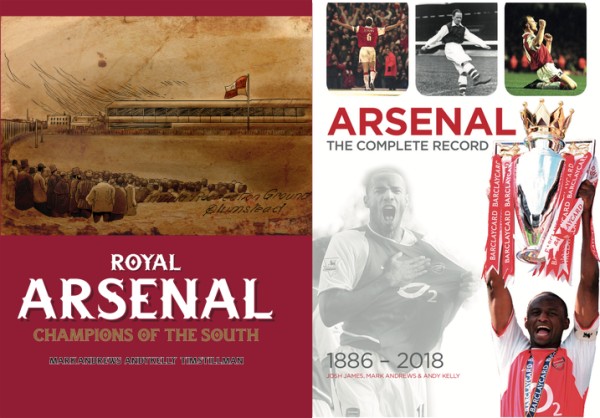Arsenal win consecutive Charity Shields
In the 1930s Arsenal appeared in seven Charity Shields, winning five of them outright. Due to the intervention of the War the Charity Shield of 1939 was not played, meaning Arsenal competed in all but two of the games during that decade highlighting the club’s pre WW2 dominance. This game was the second of the seven the Arsenal played overall.
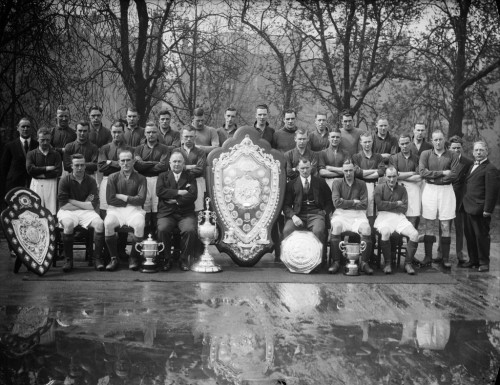
Arsenal FC with their trophies April 1931 (Photo by S. R. Gaiger/Topical Press Agency/Getty Images)
Date: Wednesday 7 October 1931
Competition: FA Charity Shield
Location: Villa Park, Aston Villa
Attendance: 21,276
Referee: Enoch Carnwell
Match Report:
Arsenal 1
Bastin 88 minutes
West Bromwich Albion 0
The two best teams of the previous season – the FA Cup holders and the League champions – met in Birmingham for the FA Charity Shield. Prior to 1974 this game was played during the season and not as a Wembley season opener. This match came after the ninth league game of the season, and WBA were favourites as they topped the table with Arsenal in fifth place. However, the Gunners had won the Shield the previous year when they beat Sheffield Wednesday 2-1 at Stamford Bridge, so were playing to retain the trophy.
The game commenced at 3.00pm in bright sunshine with Arsenal, whose only change from a full strength team was to replace Bob John with Alf Haynes, getting into their stride the quicker of the two teams. Joe Hulme was always lively and, for the Albion, Stan Wood and Tommy Magee were outstanding as they came back into this tightly contested game.
Strong defence by Herbie Roberts kept Albion at bay for the greater part of the first half, with Wood almost scoring after getting in a fine drive. The WBA full backs, George Shaw and Bert Trentham, both tried long range efforts that were well saved by Charlie Preedy. Indeed, there were many chances created by both sides but the finishing of the respective forwards of each team ensured the match remained goalless at half-time.
At the start of the second half the elusive Alex James went very close with a ground shot that just went past the post and he got more and more into the game making openings for others that were repeatedly lost as Jack Lambert, David Jack, Cliff Bastin and Hulme all missed the target. WBA had a concerted spell in attack in the run up to half time but, again, poor finishing prevented them scoring; Harry Raw, Tommy Glidden, WG Richardson and Teddy Sandford all being culpable. The inability to take chances by both sides continued after the break, in what could have been a high scoring match.
Very near the end, and against the run of play, a clever move started by James enabled Lambert to draw the defence and pass to Bastin who cut in and shot into the roof of the net. The Arsenal had won by a goal to nothing and retained the trophy, though WBA were very unlucky to lose a game that both teams wanted to win. Probably a fairer result would have been to share the trophy but this was a perfect example of the fact that a football match is won by scoring goals not by the quantity or quality of creating chances.
Line-ups:
Arsenal: C Preedy, T Parker, E Hapgood, C Jones, H Roberts, A Haynes, J Hulme, D Jack, J Lambert, A James, C Bastin.
West Bromwich Albion: H Pearson, G Shaw, B Trentham, T Magee, B Richardson, J Edwards, T Glidden, H Raw, WG Richardson, T Sandford, S Wood
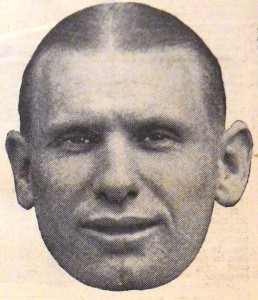
Cliff Bastin, who scored the late winner
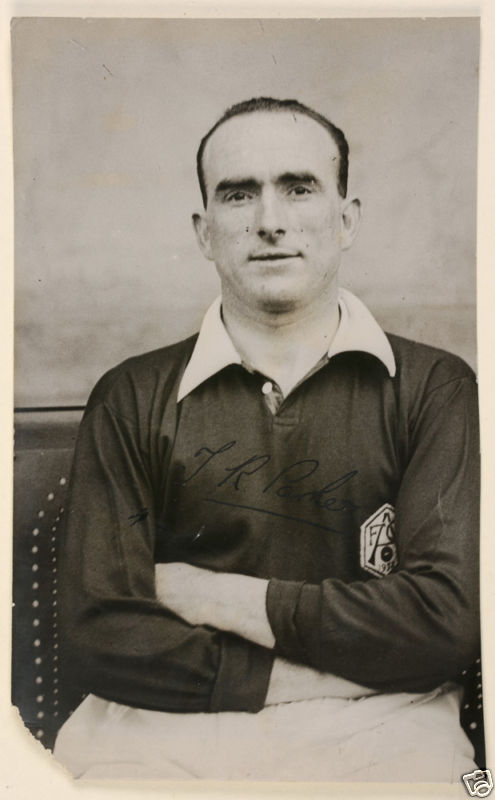
Tom Parker, The Arsenal Captain
Facts linked to the match or players:
Members of the International Selection Committee watched the Charity Shield and afterwards made their choice of the England team to meet Ireland in Belfast on Saturday 17th October for the British Home Championship. The Home Championship was an annual contest between England, Scotland, Wales and Northern Ireland, which was ended in 1983-84 having run for 100 years.
Not one player from the Charity Shield was included in England’s team that won 6-2 at Windsor Park. Later in the season Arsenal’s Cliff Bastin played in the 3-1 win against Wales and WBA’s Harold Pearson and George Shaw appeared in the victory over Scotland 3-0. Consequently England gained the 1931-32 tournament winning each game relatively easily.
William ‘Ginger’ Richardson the Baggies centre-forward for this match is the club’s second highest scorer of all time with 202 league goals, just behind Tony Brown. However if wartime games were included he would be the highest scorer as he also bagged 100 goals during the Second World War meaning in 444 appearances for Albion he scored 328 goals. He acquired the nickname ‘Ginger’ to differentiate him from the other William Richardson who played at the same time in the 1930s! Additionally, he scored both goals in the FA Cup final and the winner in the game that ensured they were promoted in 1930-31.
The rest of the season:
Arsenal completed the most unwelcome of doubles – finishing as runners up in both the League to Everton and controversially in the FA Cup to Newcastle. Arsenal’s plans went awry before the game when Alex James failed a fitness test. Arsenal took the lead with a Bob John goal but two Jack Allen goals, one in each half, were enough for Newcastle. Photographs later proved that the cross for Newcastle’s first goal was made from over the goal line, but at the time the referee allowed play to continue to the detriment of the Gunners.
West Brom finished 6th in the First Division and relinquished their hold on the FA Cup at the first hurdle to FA Cup, losing 1-2 to Aston Villa.
West Brom did the league double over Arsenal, wining 1-0 both home and away, which did little to assist Arsenal in the defence of their title. A win in either of these games would have seen the Gunners as champions.
Facts relating to the season:
WBA had won the FA cup in the 1930-31 season beating their local rivals Birmingham, which was the last time the FA Cup was won by a team outside the English top tier until Sunderland beat Leeds in 1973.
They were also promoted from the Second Division in 1930-31 which was unique together with their FA cup win, as this has not been achieved by any other team in the history of English football.
In the 3rd round of the FA Cup, Arsenal beat Darwen 11-1, their biggest ever win at Highbury.
David Jack hit a rich vein of form, scoring in nine consecutive league games, which remains a club record.
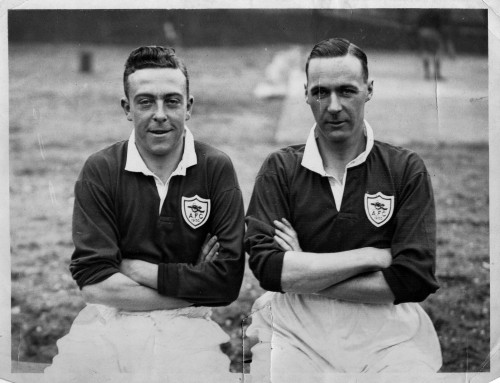
Joe Hulme and goalscoring record breaker DBN Jack
Les Compton made his first appearance this season in a career that would span 20 years.
Background to the article
This season we’ve been asked to write a regular page in the official Arsenal programme based on a classic match featuring the opponents for each game we play in. Programme editor Andy Exley has kindly given us permission to reproduce the match reports on our blog. We will also be including additional material that didn’t make the final edit of the programme. If you can’t get to The Emirates, the programme is available on iPad, iPod and android for a bargain 79 pence per issue.
—————–
Don’t forget to subscribe to the blog (top right). You know it makes sense.
Or have a look at our other site: The Arsenal Collection for more Arsenal memorabilia.
Copies of our books Royal Arsenal – Champions of the South and Arsenal: The Complete Record 1886-2018 are still available from the publishers.
